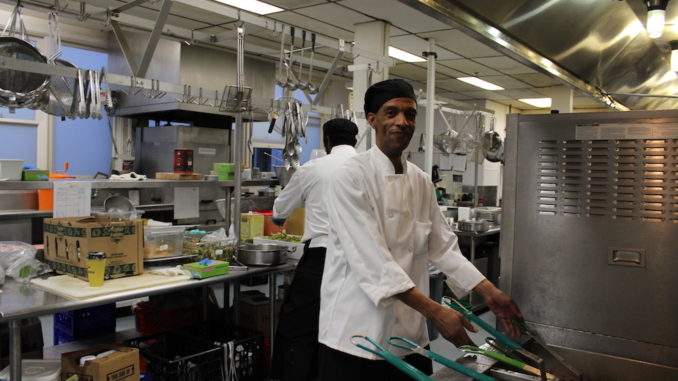
Bon Appetit is facing a labor shortage at Lewis & Clark as they attempt to adjust to the legislated increase in the Portland metro area minimum wage, which rose from $9.75 to $11.25 per hour in July. Current employees are in the process of negotiating the terms of their recent unionization while they account for the lack of adequate staff by working extra hours.
Sources disagree on the cause of the labor shortage. A supervisor, who requested to remain anonymous in order to maintain positive relations with management, attributed the shortage to the typically high turnover in the food industry.
Bon Appetit District Manager Marc Marelich agreed and noted that other industries are facing the same issue.
“The market is tough everywhere,” Marelich said.
A student employee, who wishes to remain anonymous for fear of losing their job, suggested that it could be caused by the unionization controversy that occurred last year.
“Last spring, the student workers and the full time workers reached out to a unionization group to discuss better benefits and worker treatment,” the student employee said. “Some individuals claimed that they were not making enough money to support themselves at home and with medical bills.”
After this initial organization, the former manager of Fields Dining Hall, “pulled staff into his office before the delegation, threatening them and trying to get information about how (the motion to unionize) was formed,” the student employee said.
The student employee is also suspicious that another employee, who was one of the more vocal members of the motion to unionize, was threatened or bribed by management “because he then went and did a 180 on our movement, claiming that he did not support it.” The student employee requested that this employee’s name also remain undisclosed.
Although the union is now in the midst of negotiating with management, the student employee has yet to see any changes in favor of workers’ rights and observed the residual consequences of last year’s controversy.
“I can see the fallout of what happened this semester,” the student employee said. “Four of my bosses quit and were transferred to Portland State University. These may be isolated experiences, but I recall one of them saying he didn’t want to be around here anymore due to the changes occurring and the rise in minimum wage.”
Despite these issues, the student employee said that the management staff who were responsible for allegedly intimidating staff have left. They believe conditions will likely improve.
“I think the worst of it is over,” the student employee said. “It would be a shame if the Bon got a bad reputation for the behavior of people who no longer work here.”
Bon Appetit General Manager Mac Lary said that the shortage of staff at the beginning of the school year is typical.
“Historically, the first three weeks of school is (sic) always a struggle because we’re trying to hire people and we don’t have any students that first week, because they get here and they have other things they have to do,” Lary said. “We rely heavily on (student employees), especially for dinners and weekends.”
The anonymous supervisor explained how the labor shortage has impacted the work flow.
“I don’t think it necessarily affects food quality, it more affects timing on that, so how we can’t necessarily open the doors at the exact time,” the supervisor said. “It’s rough, you know, we switch to paper plates at night because we don’t have the dishwashers to clean that stuff.”
The Bon Appetit staff are confident that the shortage is not harming LC students in any way.
“We’re not sacrificing quality, we’re not sacrificing service,” Marelich said.
“The changes they did in the food programming is (sic) to ensure that our community, especially our students, do not bear the financial burden of the increases related to these important factors,” Dean of Students Anna Gonzalez said.
The management team and employees spoke about how their work environment is affected by this shortage.
“The work environment is a little tense,” the supervisor said. “I think people come together really well in times like that, but it varies a lot.”
Betty Patten, a food service staff member, and Marelich have observed that this struggle has engendered a strong team effort.
“People are just jumping in more and helping out,” Patten said. “That’s the name of the game. Students come and you gotta provide for the students, so that’s what we do.”
“People are tired. I mean, that’s understandable,” Marelich said. “It’s never been this crazy with trying to hire people. But when we go through this, it pulls people together more.”
The number of hours that Bon Appetit workers are putting in has increased. Some employees are working 15 hours in a day.
“A lot of people are putting in a lot of hours,” Marelich said. “Look at me, I’m a district manager and I’m in my chef coat, so I’ve been doing the same.”
This issue is ongoing, and management has identified an increase in student employment as a likely solution.
Subscribe to the Mossy Log Newsletter
Stay up to date with the goings-on at Lewis & Clark! Get the top stories or your favorite section delivered to your inbox whenever we release a new issue.

Leave a Reply